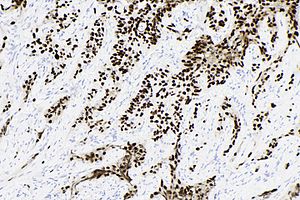Difference between revisions of "Paired box gene 8"
Jump to navigation
Jump to search
| Line 10: | Line 10: | ||
| Use = RCC versus other, gynecologic tract malignancy versus other | | Use = RCC versus other, gynecologic tract malignancy versus other | ||
| Subspecial = [[gynecologic pathology]], [[genitourinary pathology]] | | Subspecial = [[gynecologic pathology]], [[genitourinary pathology]] | ||
| Pattern = | | Pattern = nuclear stain | ||
| Positive = [[renal cell carcinoma]]s, [[renal oncocytoma]], thyroid tumours, [[serous carcinoma]], [[endometrial carcinoma]]s | | Positive = [[renal cell carcinoma]]s, [[renal oncocytoma]], thyroid tumours, [[serous carcinoma]], [[endometrial carcinoma]]s | ||
| Negative = | | Negative = | ||
Revision as of 22:24, 1 August 2016
| Paired box gene 8 | |
|---|---|
| Immunostain in short | |
 PAX8 staining in a poorly differentiated carcinoma. | |
| Abbreviation | PAX8 |
| Use | RCC versus other, gynecologic tract malignancy versus other |
| Subspeciality | gynecologic pathology, genitourinary pathology |
| Normal staining pattern | nuclear stain |
| Positive | renal cell carcinomas, renal oncocytoma, thyroid tumours, serous carcinoma, endometrial carcinomas |
Paired box gene 8, commonly known by the abbreviation PAX8, is a commonly used immunostain in gynecologic pathology and genitourinary pathology.
Tumours with positive staining
- Thyroid tumours ~ 90%.[1]
- Renal cell carcinomas ~ 90%.[1]
- Renal oncocytomas ~ 80%.[1]
- High-grade ovarian serous carcinomas ~ 99%.[1]
- Nonserous epithelial ovarian neoplasms ~ 70%.[1]
- Endometrial carcinomas ~ 98%.[1]